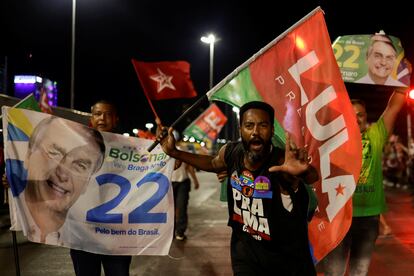Lula leads Bolsonaro in Brazil polls but undecided voters leave room for doubt
The current president is just under five points behind on average, but polling suggests the outcome will depend largely on where the decisive 7.6% of undecided voters side

Luiz Inácio Lula da Silva (48.6%) is consistently ahead of Jair Bolsonaro (43.8%) in the race for the presidency of Brazil, according to all the polls carried out after the first electoral round. But his lead is small, at less than five points, and therefore inconclusive, at least for now. In fact, Lula’s advantage is substantially smaller than the total number of undecideds remaining among potential voters. This leaves the battle more open and in the hands of this group of doubters, who are currently preventing either of the two candidates from reaching the pivotal 51% mark.
According to the pollsters, neither of the two candidates have managed to add much in the way of solid support if we take October 2 and the bulk of voters they had managed to sway by then as a starting point. Bolsonaro has added just 0.4 percentage points while Lula has garnered a meager 0.2. That means there are as many undecided voters as there are people who opted for third-party candidates in the first round. It should however be noted that all these quantities are relative: percentages of a section of the population previously defined as “likely voters.” But the outflows and inflows of that mass (and, therefore, towards abstention) count for as much or even more than voter shift between the candidates.

Polls understimated Bolsonaro’s electoral potential
Most polls place Lula at below 50%, with the advantage attributed to the former president varying from 0.4 to 9 points: the average is 4.8, a value almost identical to the 5.2% by which he emerged on top after the first round. The biggest surprise at that time was precisely this figure, which was half of what was anticipated by the pollster’s consensus. In other words, the biggest failure of the majority of polls was in their underestimation of Bolsonaro’s electoral potential. It was the only major flaw: Everything else came to pass as expected by the polls, which correctly forecast the essential contours of the result. Lula would finish ahead of the current president and both would easily see off the challenge of the rest of the candidates, but neither of them would achieve the 50% necessary to stave off a second round of voting.
Despite these successful estimates, the focus of public debate since the night of October 2 quickly turned to the error the pollsters made with regard to the right. This fixation on errors is common in post-election periods and can be explained from a cognitive perspective: if the polls are a mirror in which society expects to see itself reflected, distortion will always draw more attention than clearly defined lines. Even a person who has never seen a mirror can feel their face and count two eyes, one nose, two ears and one mouth. In the same way, a society can, in an awkward and imperfect manner, self-examine itself through more or less general conversations - in bars, on social networks or in the media - and come to the knowledge that there was never any realistic rival for Lula or Bolsonaro. Moreover, once we confirm our intuition, the prognosis becomes a landscape. It is assigned a probability rating of 100% and we cease to use it as a criterion to evaluate the quality of the prediction. Paradoxically, this turns attention to where the greatest uncertainty remains; precisely that which is the most problematic for both clumsy and precise methods alike to predict.
However, not everything is cognitive bias. There is an analytical and forward-looking sense in that attention. Having arrived at a runoff vote with only two candidates, a hypothetical significant error regarding either one of them could also indicate an error in the essential: anticipating who will win. It is still too early to speculate and there is still time for the undecided to make up their minds - and for the pollsters to adjust their methods. But, for now, there is at least one reason for caution: a negative correlation between the mistake that each pollster made in its last published poll regarding Bolsonaro and the percentage of the vote they forecast him receiving today. That is to say, those polls that underestimated the incumbent in the first round still have him below Lula, despite the fact that everyone already assumes he will post a result similar to that obtained on October 2 in the first round. There has been an upward adjustment, but all of the polls have adjusted more or less proportionally in relation to where the two candidates were before the initial vote.
While the average distance between the two candidates predicted by these same pollsters is less than the total number of undecided voters, it would be sufficient if - as was the case on October 2 - a majority of these voters decided to cast their ballot in favor of the current president for Lula’s advantage to be dramatically reduced: a turnaround the polls failed to anticipate.
Tu suscripción se está usando en otro dispositivo
¿Quieres añadir otro usuario a tu suscripción?
Si continúas leyendo en este dispositivo, no se podrá leer en el otro.
FlechaTu suscripción se está usando en otro dispositivo y solo puedes acceder a EL PAÍS desde un dispositivo a la vez.
Si quieres compartir tu cuenta, cambia tu suscripción a la modalidad Premium, así podrás añadir otro usuario. Cada uno accederá con su propia cuenta de email, lo que os permitirá personalizar vuestra experiencia en EL PAÍS.
¿Tienes una suscripción de empresa? Accede aquí para contratar más cuentas.
En el caso de no saber quién está usando tu cuenta, te recomendamos cambiar tu contraseña aquí.
Si decides continuar compartiendo tu cuenta, este mensaje se mostrará en tu dispositivo y en el de la otra persona que está usando tu cuenta de forma indefinida, afectando a tu experiencia de lectura. Puedes consultar aquí los términos y condiciones de la suscripción digital.









































